How Do You See the World?
Community Comments: Abortion, Christianity, and the Cult of Progressivism
I wrote a post about abortion this week.
In the post, I shared a personal story of mine from when I was twenty years old: I encouraged a friend to get an abortion, thinking that it was the responsible thing for her to do. I didn’t even question it. I thought it was what was best for her. It was the biggest mistake of my life.
I was delighted (and simultaneously heartbroken) to see women sharing their own stories in the comments. It seems like a lot of women have been fed the lie of abortion as an easy way out of a bad situation, only to see the true consequences afterwards. The medical establishment preaches “informed consent,” yet many women who choose to have abortions don’t understand what they’re doing until it’s too late.
Take this comment from
, who has had abortions and feels that she was lied to:And this one from
, who advised a loved one to get an abortion, only to witness the harm that it caused: mentions that she never considered that there could be a sacred connection between mother and child. ’ friend is now on a spiritual path of healing after many years.There’s a clear spiritual element to the abortion topic. It involves a metaphysical reality that’s impossible to truly describe. I didn’t understand this when I advised my friend to get an abortion. I was an atheist—if I had been presented with this argument in my adolescence, I probably would’ve rejected it.
I was also a raging liberal. A college student majoring in psychology and sociology (don’t judge—in hindsight, it was a good lesson in how not to think). Everything was socially-constructed; nothing was sacred. Everyone I knew who thought like me was depressed, but we were still convinced that we were the ones who were right, and that it was the judgmental people who believed in fake stories who were in denial.
There are some evil people in the world, but for the most part, people don’t hold beliefs with the intent of doing harm. We’re all just walking around all on our own with an entirely unique view of the world, unaware that the people around us all have a conception of reality that is entirely different from our own.
It brings up an interesting point. Is reality subjective? Some things are, I’m sure. But not the important stuff. In fact, I think the biggest argument in favor of a universal morality is the fact that even in a society that is largely accepting of the practice, women are damaged by abortions.
It’s such a difficult topic to talk about, and now that I’m sharing other peoples’ stories, I feel the need to do them justice—a task which I’m not even sure is possible.
Substack happens to be a great place to talk about topics like this. Conversations about abortion so often devolve into heated arguments where no one gives an inch, yet the discussion this article sparked was open-minded and constructive.
This remained the case even though I made a major blunder in the post. I implied that anti-abortion advocates viewed women who had abortions as ‘monsters,’ attacking the misconception I had of pro-life advocates when I was a young college-aged liberal, instead of promoting a genuine understanding of who they are as people. The original statement (and my explanation of what happened) is available on the original post, if you’re interested.
The whole thing served to illustrate an important point. Despite having committed myself to take a ‘nonpartisan’ view of things, and despite the fact that I was trying my very best to treat the topic with sensitivity, an old bias of mine crept in (ironically, one that I don’t even believe anymore).
I’m glad it happened, though, because this led to a great conversation with
. I learned a lot from it, so I’m going to include it here in its entirety:I love these rare and enlightening conversations that show me just how much I still have to learn about the world. For one, I don’t have any clue what pro-life support centers are like.
also gave some insight on the great work that is done in these places:What stuck with me the most from my conversation with Michelle was her last comment, in which she pointed out that growing up in New York City, I’ve never really been exposed to ‘true’ Christianity.
I was raised Catholic. My mom took me to church on Sundays. I went to Catholic school for a few years. All I learned from this was that church was boring and that, if my religion teacher was correct, I was going to Hell. I think my mom has a more positive relationship with Catholicism. My grandmother certainly did. But by the time my generation got to Sunday school, the Church was dying.
For the longest time, I had this image of Christianity as an oppressive, judgmental religion, and all my friends confirmed this worldview. The student body of my Catholic school was comprised predominantly of atheists. We were all ‘Christians in Name Only,’ and the boldest among us were even dropping that label.
It was on Substack that I learned to conceptualize Christianity as a spiritual framework, rather than an oppressive doctrine. It was on here that I conversed with ‘true’ Christians, who had thought extensively about their faith and could have deep, meaningful conversations about it.
I don’t consider myself a Christian; although I hold some Christian ideas, my own spiritual understanding was developed separate from this faith. However, once we get over the labels, spiritual people of all kinds have more similarities than differences.
This was an important lesson in the disconnect between people. My college-aged self would’ve heard the word ‘Christian’ and shut down, dismissing that person as an oppressive, judgmental religious nut, no matter how right and how well-meaning they were. This is not okay.
We can’t keep holing ourselves up into these ideological camps where we stereotype the other side and argue moot points. We need to listen to what people are actually saying, even if the words they use to describe themselves are different than the words we use to describe ourselves.
We divide ourselves into ideological camps and demonize the other side because it is easier. We don’t have to come up with all the answers on our own, and if we’re wrong, well, at least we weren’t solely responsible.
This doesn’t hold up in the real world, though. It doesn’t help in situations like abortion, when the stakes are real and dire and the consequences are more than just social constructions.
Substack is a tolerant place. The conversations that we’re able to have on here are rare. The hard part is reaching the people who truly need it—the vulnerable young women considering abortion who have been indoctrinated into the opinion that it doesn’t matter.
As
points out, the discourse regarding abortion has gotten more extreme in recent years. The pro-choice movement (and feminism in general) started as a much-needed protection for women who were powerless and often in dangerous situations. It only took its current form recently. Things always tend towards the extreme. also presented this side of the debate, recommending an interview with Faye Wattleton, a former director of Planned Parenthood. :Wattleton articulates a compelling and sincere pro-choice argument. The stakes are real, and this isn’t a joke.
There are no black-and-white answers, and what we need isn’t more laws. What we need is informed consent.
If every woman who had an abortion understood what it truly was that they were doing, I suspect this conversation would look entirely different.
I apologize to the many people who commented on this post whose comments I did not mention. There were so many deeply impactful ones that I haven’t mentioned; I simply didn’t have the space in this post to get to them all.
Thank you all for reading, and for your discussion. I’ve learned so much from all of you.




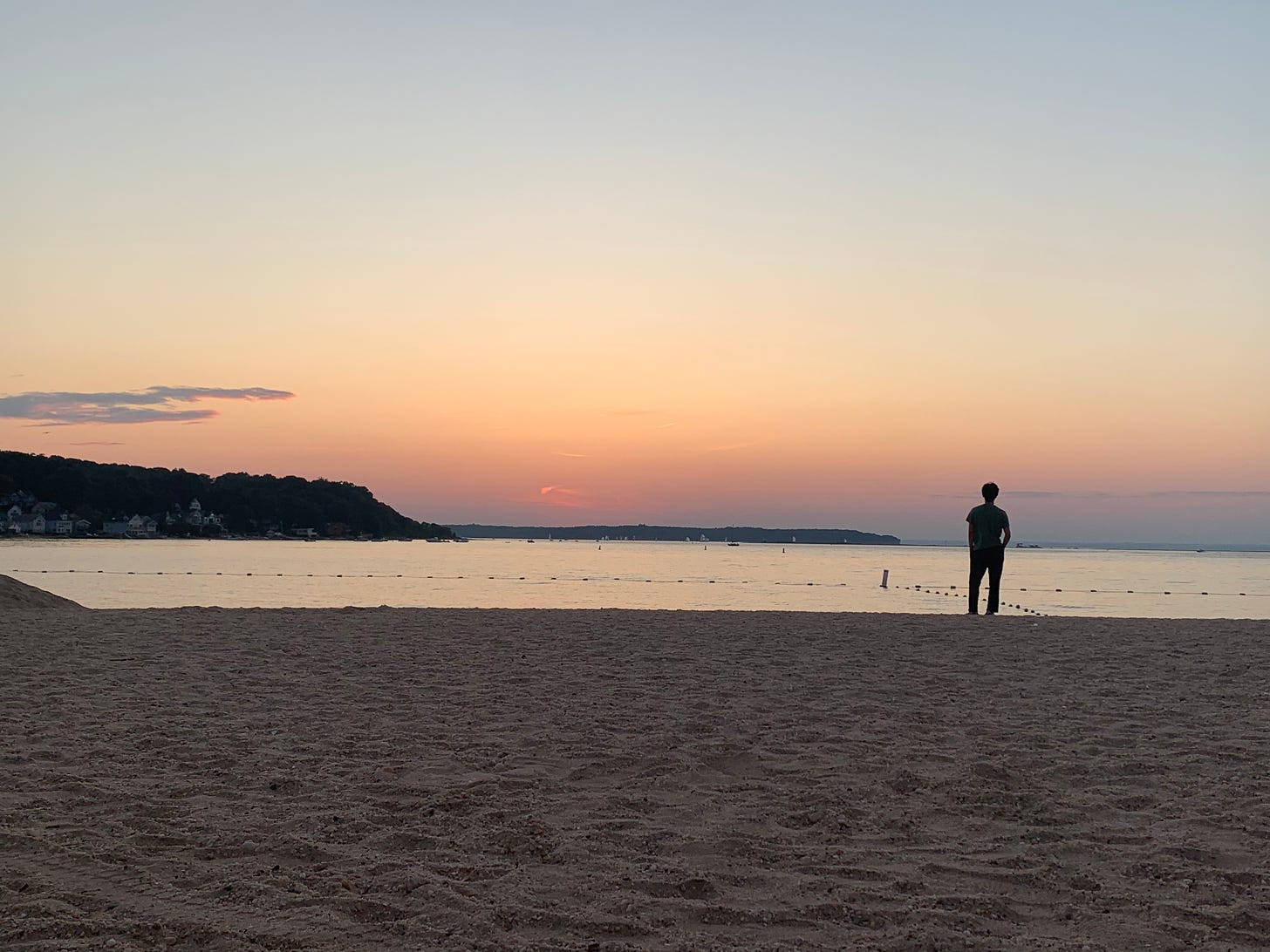
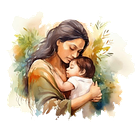


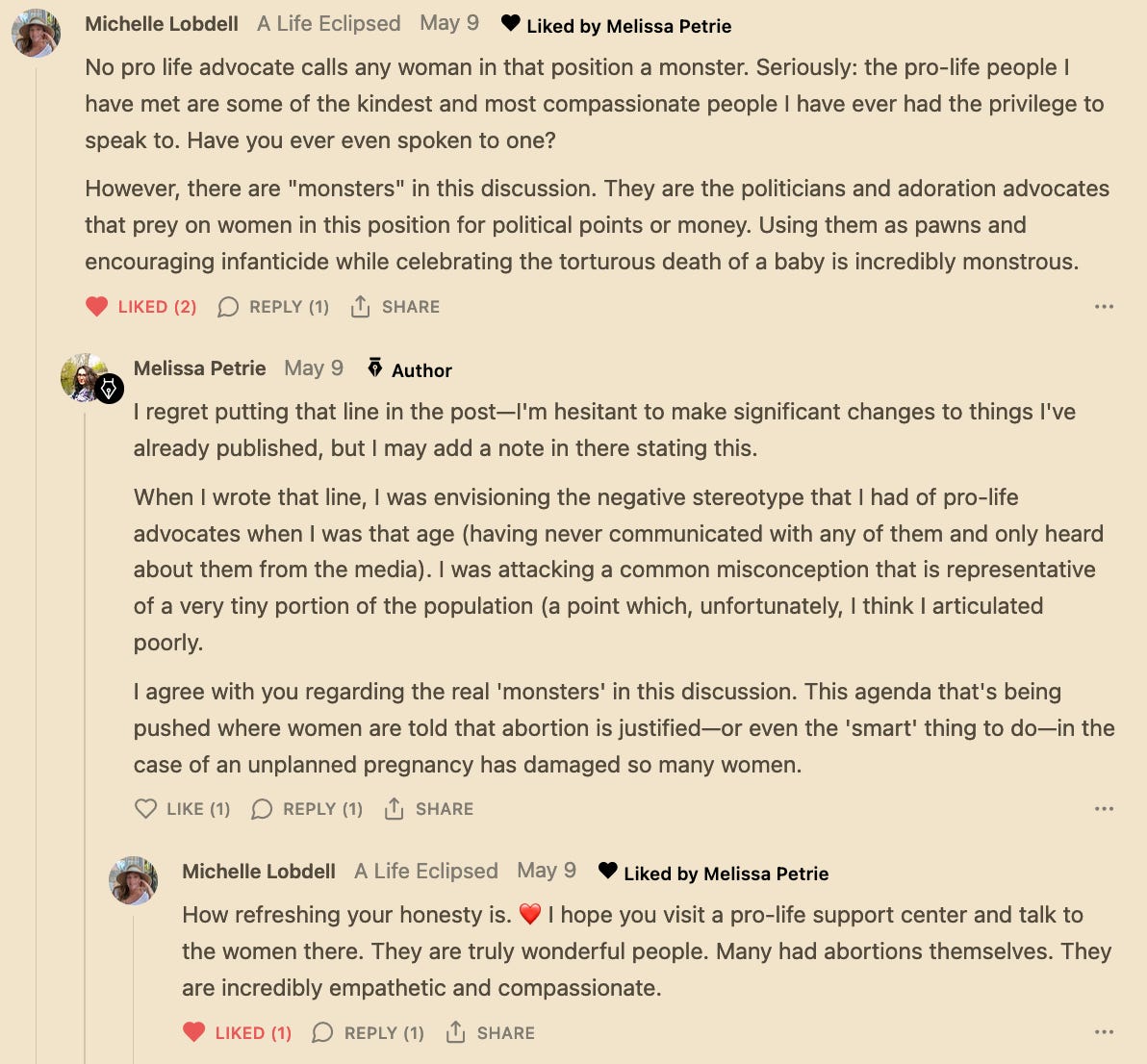

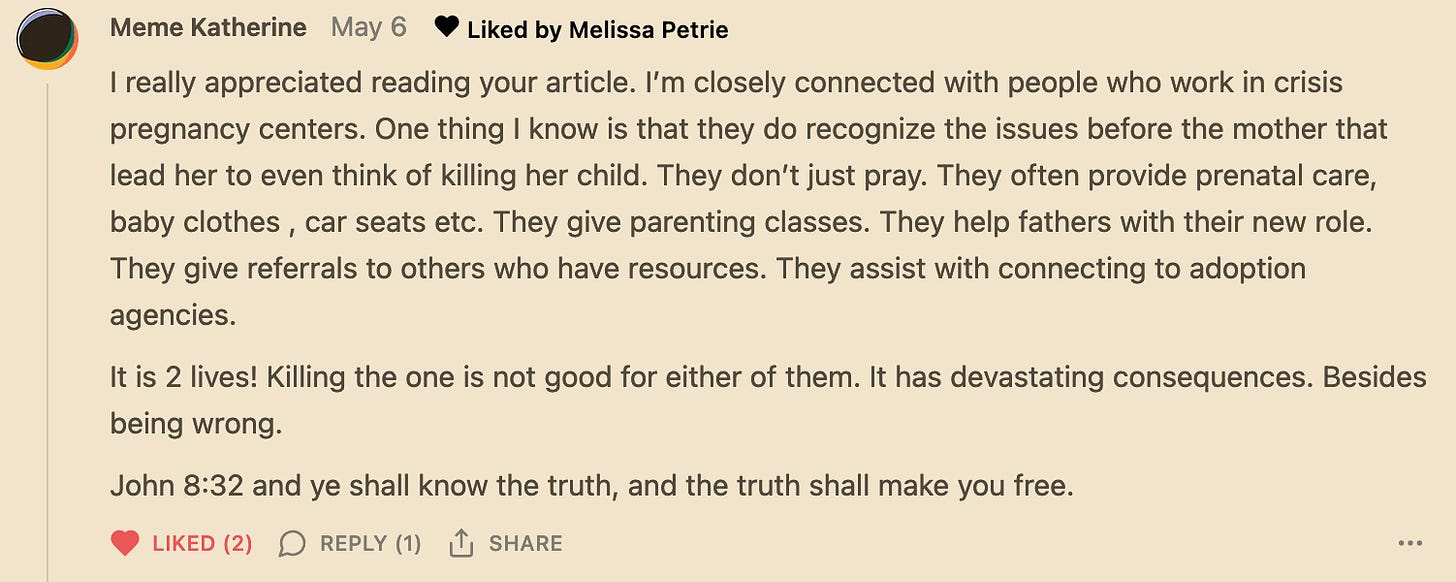
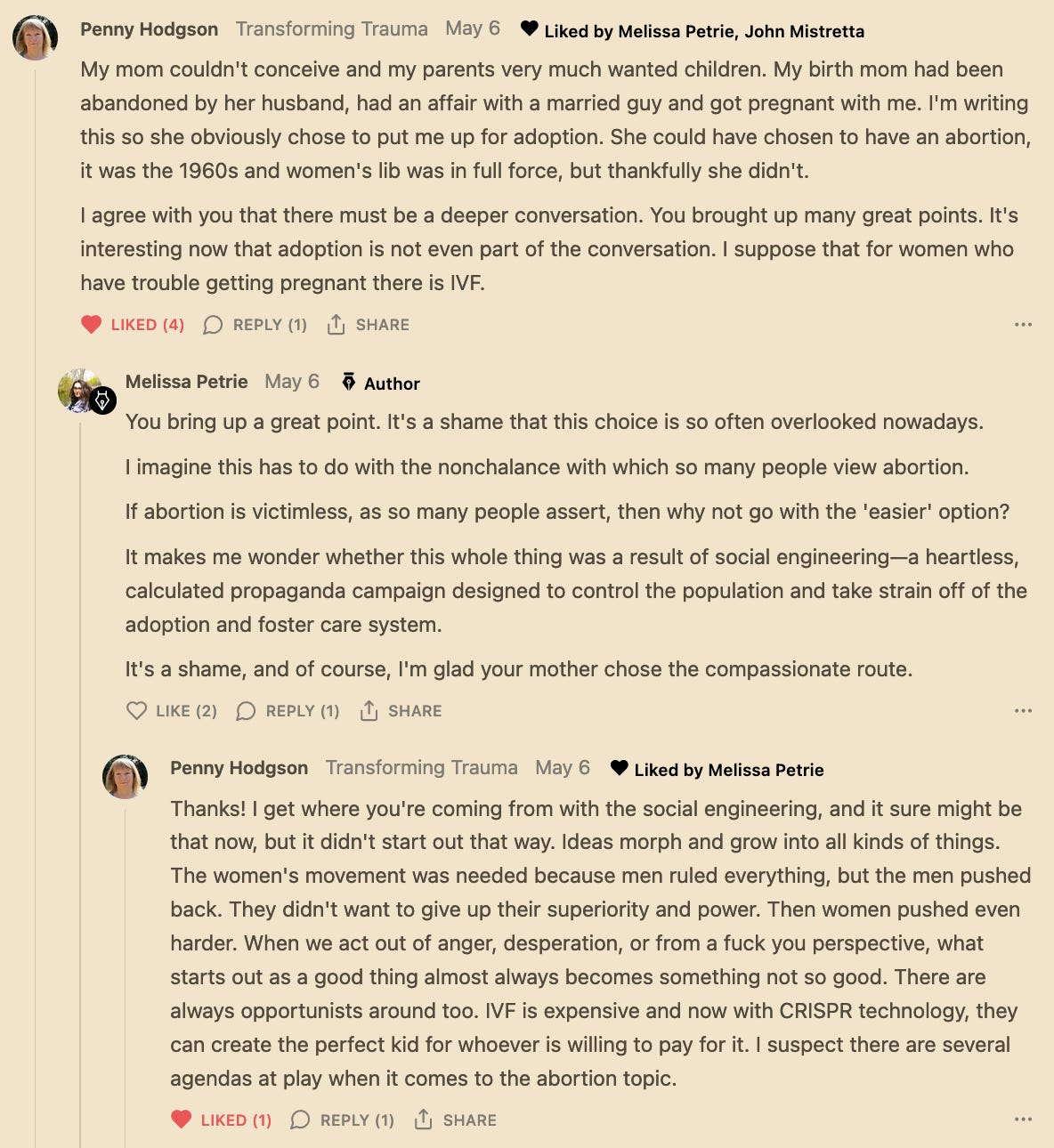

Wow Melissa! This is a fantastic post! Thanks for having the courage to discuss this!
My post is now up, I solicit your comments or even a responding post. If you do respond, please let me know so I can link to it.
https://open.substack.com/pub/vonwriting/p/you-are-a-monster?r=6csnm&utm_medium=ios